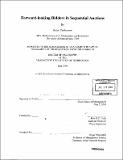Forward-looking bidders in sequential auctions
Author(s)
Zeithammer, Robert, 1975-
DownloadFull printable version (4.075Mb)
Other Contributors
Sloan School of Management.
Advisor
John D.C. Little.
Terms of use
Metadata
Show full item recordAbstract
At Internet auction sites like eBay, similar goods are often sold in a sequence of auctions. Buyers can therefore benefit from forward-looking bidding strategies that take into account the available information about future auctions. This dissertation develops a model of such bidding, provides both experimental and econometric evidence of the model's relevance to behavior, and explores the impact of forward-looking bidding on the seller's optimal selling strategy as well as on the overall market equilibrium. Extending prior sequential-auction theories, the proposed model assumes that bidders know their private valuations of objects auctioned in the near future. Rational bidders "bargain-hunt" in that they bid less than they would otherwise, and early bids decrease with the private values of later objects. The model's predictions are tested in two laboratory experiments, both involving a sequence of two auctions. Both experiments show that first-auction bids decrease with the private values of the future object, but the second experiment suggests that the average decrease is smaller than predicted by the theory. An econometric analysis of eBay data finds that buyers seem to look ahead, and on average adjust their bids down as a function of their private preferences for the objects sold in the near future. They also bid less when the same item they are bidding on is available within the next few auctions. To explore the supply-side of a sequential auction marketplace, the dissertation analyzes a model of a long-lived monopolist facing overlapping generations of forward-looking buyers. When the seller learns about the current auction-market demand from past prices, bargain-hunting poses not only the obvious cost of a lower average revenue, but it also provides a benefit to the seller by making prices more informative. (cont.) In equilibrium, the seller limits the extent of bargain-hunting by threatening to withhold future supply, but the threat is only credible when the profitability of the auction-market is close to the seller's outside option. Therefore, bargain-hunting can coexist with strategic selling, but is shown to be a self-regulating phenomenon that diminishes when the existence of the auction-market is threatened by an outside spot-market.
Description
Thesis (Ph. D.)--Massachusetts Institute of Technology, Sloan School of Management, 2003. Includes bibliographical references (leaves 95-97).
Date issued
2003Department
Sloan School of ManagementPublisher
Massachusetts Institute of Technology
Keywords
Sloan School of Management.